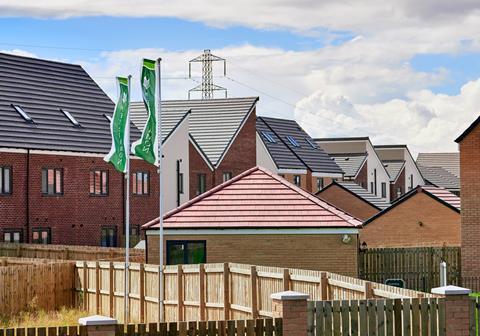Housebuilder鈥檚 shares hit as firm cancels shareholders payout scheme and raises building safety allocation to 拢350m
More than 拢200m has been wiped off the value of housebuilder Persimmon today as the firm blamed 鈥渦niquely disruptive political conditions鈥� for a sharp deterioration in sales and an increase in cancellations.
Shares in the UK鈥檚 second largest builder by volume fell as much as 8% in early trading before settling around 6% down as the firm cancelled its long-term capital return programme, said volume will fall next year and hugely increased its provision for building safety repairs.

The 拢3.6bn turnover housebuilder, issuing a trading update for the period between 1 July up to yesterday, said that while private sales per site per week had dropped to a 鈥渞esilient鈥� 0.60 per site per week overall, from 0.78 in the same period last year, this had spiralled to 0.48 when taking just the period from September.
In addition, the average price of homes sold in this period actually dropped by 2%.
The trading update said the drop in sales and prices reflected 鈥渢he uniquely disruptive political conditions and deteriorating economic outlook since September鈥�.
The firm also said it had seen cancellation rates increase from 21% in the first 12 weeks from July to 28% in the most recent six weeks amid the turmoil in the mortgage market, which it said left 鈥渟ome uncertainty鈥� over it hitting expected volume of between 14,000- and 15,000 completions in 2022.
Persimmon also said that around 20% of its sales in the period had come through the government鈥檚 Help to Buy scheme, which offered equity loans for those struggling to raise deposits, but which has now closed to new applicants.
While the business said its financial position remained strong, with an expectation of ending the year with 拢700m in cash, with the firm boasting a 鈥渉ealthy forward sales position鈥� and build rates running 20% ahead of 2021, it said the outlook for next year was unclear given the current 鈥減eriod of heightened market uncertainty鈥�.
It said it was 鈥渢oo early鈥� to provide specific guidance on numbers for 2023 given the 鈥渞ecent and rapid change in market conditions鈥�, but that its current expectation was that it will deliver 鈥渇ewer legal completions鈥� and that with sales prices expected to drop, this 鈥渨ill have an impact on 2023 margins鈥�.
The figures come after the that private housing starts will drop 10% next year, with predicting an equal fall in house prices.
Persimmon鈥檚 sales rate drop since September matches that reported by both Barratt and Bellway late last month. Dean Finch, group chief executive, said: 鈥淧ersimmon entered 2022 in a strong position with healthy forward sales and good weekly sales rates which continued throughout the first half of the year.
鈥淭his, together with our increasing levels of build efficiency, means we are well positioned to deliver new home completions for the year within our previously stated target range, while maintaining an industry-leading housing margin, despite the recent deterioration in market conditions leading to increased cancellation rates.
>>See also: Are we seeing the start of a housing development slowdown?
鈥淩ising interest rates and broader economic uncertainty are clearly impacting mortgage lending and customer behaviour and this is reflected in our recent weekly sales rates and forward sales position. Persimmon enters this more challenging period as a five-star builder, with average selling prices below the market average, high quality land holdings, and a robust balance sheet.鈥�
In addition to its trading challenges, Persimmon increased the provision for repairing fire safety defects on previously built homes from the 拢75m previously stated by an enormous 拢275m to 拢350m. Persimmon said the revision was due to the number of eligible multi-storey developments it is responsible for increasing to 71, plus 鈥渁 more detailed understanding of costs, which now include non-cladding fire related build defects鈥�.
In response to these challenges, Persimmon said it was 鈥渃oncluding鈥� its existing capital return programme, under which it has given billions of pounds back to shareholders. The firm said it was setting up a new capital allocations policy, for which the first principle was to 鈥淚nvest in the long-term performance of Persimmon by ensuring the business retains sufficient capital to continue our disciplined and appropriately timed approach to land acquisition鈥� 鈥� rather than return money to shareholders.
It said that while regular dividends would continue, excess capital would only be distributed to shareholders 鈥渇rom time to time, through a share buyback or special dividend鈥�, rather than as a regular planned expectation.
The firm said it was responding to 鈥渢he increased uncertainty in the political and macro-economic environment, alongside increased corporation tax and the residential property developer tax鈥�.



























No comments yet